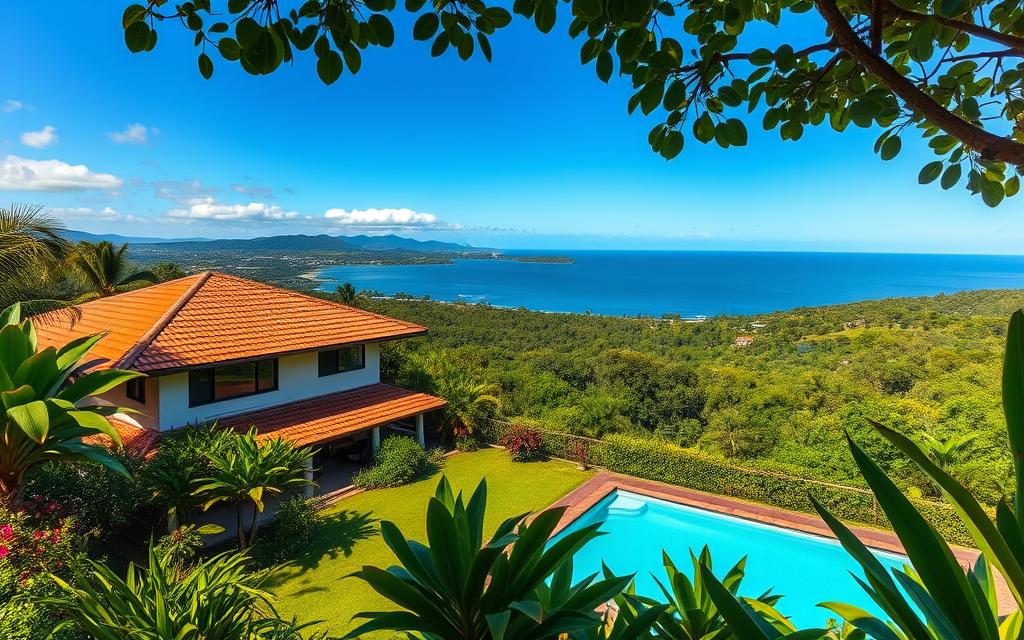
How to Secure Your Loan with Real Estate in Costa Rica
Costa Rica’s stunning natural beauty and stable economy have made it a magnet for foreign investors, with foreign investment in Costa Rican real estate surging by over 20 percent in the past year alone.
While finding your dream property in Costa Rica can be straightforward, navigating the financing options can be complex. At GAP Investments, we specialize in providing tailored financing solutions for private investors, understanding the unique needs of foreign and expat investors.
We prioritize safety and risk management, offering a secure investment environment. Our expertise will guide you through the process of securing your loan with real estate in Costa Rica, ensuring that you make informed investment decisions.
Understanding the Costa Rican Real Estate Market
The Costa Rican real estate market presents a unique blend of stability and growth, making it an attractive option for investors. As we explore the current state of the market, it’s clear that Costa Rica’s property sector is thriving, driven by a combination of local demand and foreign investment.
Current Market Trends and Investment Opportunities
The Costa Rican property market has demonstrated remarkable stability, with annual appreciation rates ranging from 8 to 15 percent in popular regions such as Guanacaste, San José, and coastal towns along the Pacific.Current trends indicate a strong demand for properties in these areas, driven by tourism growth and infrastructure development. This has created diverse investment opportunities, from beachfront condos to eco-lodges, catering to various investor preferences.
Foreign Ownership Rights in Costa Rica
Costa Rica’s legal framework is notably investor-friendly, allowing full foreign ownership of titled property. This means that foreign investors have the same rights as Costa Rican citizens, providing a secure environment for investment. Understanding the legal aspects, particularly concerning properties in the maritime zone, is crucial for foreign investors to navigate the market effectively.
Why Real Estate is a Secure Collateral Option in Costa Rica
When it comes to securing a loan, Costa Rica’s property market stands out as a reliable collateral option. We find that the country’s real estate represents a secure form of collateral due to its historically stable property market and conservative lending practices.

Stability of the Costa Rican Property Market
The Costa Rican property market has demonstrated remarkable stability, with no bank failures in the country’s history. This stability is partly due to the conservative lending practices in Costa Rica, where financial institutions do not lend money easily. As a result, property owners in Costa Rica are typically financially stable individuals who have made substantial cash investments in their properties.
Legal Protections for Property Owners
Costa Rica’s legal system provides robust protections for property owners, including clear title registration processes and strong enforcement mechanisms. Foreign investors benefit from the same legal protections as local property owners, creating a level playing field for using real estate as loan collateral. The combination of market stability and legal protections makes Costa Rican real estate one of the most secure forms of collateral in Central America.
Types of Loans Available for Real Estate in Costa Rica
Costa Rica’s real estate sector is supported by a variety of loan options. When investing in Costa Rican real estate, understanding the different types of loans available is crucial for making informed decisions.
Traditional Bank Loans
Traditional bank loans in Costa Rica are offered by reputable institutions such as BAC San José, Banco Nacional, Banco de Costa Rica (BCR), and Scotiabank. These banks provide financing to both locals and foreigners, although the approval process for non-residents can be complex.
- Lower interest rates compared to other loan options
- Extensive documentation required
- Difficult for non-residents to obtain
Private Lending Options
Private lending options have gained popularity among foreign investors due to their flexible terms and faster approval processes. Private lenders in Costa Rica specialize in working with foreign investors, offering tailored financing solutions.
- More flexible terms than traditional bank loans
- Faster approval processes
- Tailored financing solutions for individual needs
Developer Financing
Developer financing is an alternative for buyers purchasing directly from property developers. This option often comes with more accessible qualification requirements for foreigners. By choosing developer financing, buyers can secure funding directly from the property developer, especially for new construction properties.
For more information on private lending solutions, you can visit our thank you page.
How to Secure Your Loan with Real Estate in Costa Rica
Investors looking to secure a loan in Costa Rica can leverage their real estate assets through mortgages or trusts. This approach provides a secure and flexible financing option, catering to various investment needs.

The Mortgage Process Explained
The mortgage process in Costa Rica is a well-established method for securing loans. It requires a formal document signed by both the borrower and property owner (if different) before a Costa Rican Notary Public. Mortgages can be stipulated in any currency, offering flexibility for international investors.
The mortgage registration process involves recording the loan in the National Registry, creating a legal lien against the property that protects the lender’s interests. One property can secure multiple loans, or one loan can be secured by multiple properties, providing flexibility in structuring financing arrangements.
Using Trusts as Security Mechanisms
Using trusts as security mechanisms is an alternative approach, particularly useful in situations where traditional mortgages cannot be implemented, such as with concession properties. Trusts offer a flexible and secure way to guarantee loan repayment, providing an additional layer of protection for lenders.
Proper implementation of security mechanisms, whether through mortgages or trusts, requires careful attention to legal details and proper documentation to ensure enforceability. Working with experienced legal professionals is essential to navigate the complexities of securing loans with real estate in Costa Rica.
Requirements for Foreign Investors Seeking Financing
Securing financing in Costa Rica as a foreign investor can be daunting, but being informed about the necessary requirements can simplify the process. Foreign investors must navigate a unique set of challenges when seeking financing in Costa Rica.

Documentation Needed
Foreign investors seeking financing in Costa Rica need to be prepared with comprehensive documentation. Required documents typically include proof of income, credit history, bank statements, and personal identification, which may need to be translated into Spanish and notarized.
- Proof of income and credit history
- Bank statements and personal identification
- Translation and notarization of documents
Residency Considerations
Residency status plays a significant role in loan approval processes in Costa Rica. Obtaining temporary or permanent residency can significantly improve a foreign investor’s chances of qualifying for traditional bank financing.
- Residency status impacts loan approval
- Benefits of temporary or permanent residency
- Stricter requirements for non-resident investors
Understanding these requirements in advance can help investors prepare properly and improve their chances of securing financing for their Costa Rican real estate investments.
Private Lending with GAP Investments
At GAP Investments, we specialize in providing private lending solutions for real estate investments in Costa Rica. Our years of expertise have enabled us to help numerous clients succeed in their investment ventures.
We understand that traditional bank financing may not be accessible to all investors, particularly foreign investors. That’s where our private lending options come into play, offering a flexible and efficient way to secure funding for your real estate projects.
Loan Options and Terms
Our loan options range from $50,000 to over $3,000,000 USD, accommodating various investment scales from small property purchases to large development projects. We offer flexible loan terms ranging from six months to three years, allowing investors to structure financing that aligns with their investment strategy and cash flow projections.
Unlike traditional banks, our private lending approach focuses on the value of the real estate collateral rather than solely on the borrower’s credit history or residency status.
Interest Rates and Financing Structures
Our competitive interest rates range from 12% to 18% annually, with specific rates determined by factors such as loan-to-value ratio (LTV) and the borrower’s financial profile. Private investors working with GAP Investments can earn attractive returns while their investments are secured by valuable real estate collateral.
Our financing structures are designed to meet the unique needs of foreign and expat investors in the Costa Rican market, ensuring that both lender and borrower interests are protected.
Step-by-Step Guide to Applying for a Real Estate Loan
To secure a real estate loan in Costa Rica, it’s essential to follow a step-by-step guide that covers the entire application process. This guide helps investors prepare adequately and set realistic expectations for the timeline of securing a real estate loan.
Initial Consultation and Property Evaluation
The loan application process begins with an initial consultation to discuss financing needs, investment goals, and the property you wish to purchase or use as collateral. Property evaluation is a critical step, involving a thorough assessment of the real estate’s value, legal status, and potential as collateral.
Application Submission and Documentation
The application submission phase requires gathering and preparing extensive documentation, including identification, proof of income, credit history, and property information. For foreign applicants, documents typically need to be translated into Spanish and may require notarization or apostille certification.
Approval Process and Funding
The approval process involves a detailed review of both the applicant’s financial profile and the property’s legal status and value. Once approved, the funding process includes finalizing loan terms, signing legal documents, and establishing the security mechanism. Working with experienced professionals, like GAP Investments, can significantly streamline this process.
Legal Considerations When Using Real Estate as Collateral
When using real estate as collateral in Costa Rica, it’s crucial to understand the legal framework that governs such transactions. This understanding ensures that both lenders and borrowers are protected and aware of their rights and obligations.
Mortgage Registration Process
The mortgage registration process in Costa Rica involves registering the security interest with the National Registry, creating a legal lien against the property. The cost for this registration is approximately 1.64% of the total mortgage amount, typically borne by the borrower in addition to standard closing fees. For instance, on a $200,000 mortgage, the registration cost would be $3,294.
Rights and Obligations of Borrowers
Borrowers in Costa Rica have specific rights and obligations under the law. They have the right to early repayment and are obligated to maintain the property in good condition. Costa Rica’s mortgage laws are robust, providing strong protections for both lenders and borrowers, thus creating a secure legal framework for real estate-backed loans.
Risk Management Strategies for Real Estate Loans
Costa Rica’s real estate market presents unique challenges that require robust risk management for loans. Effective risk management is essential for lenders to protect their investments and ensure the long-term viability of real estate financing in the region.
Insurance Requirements
Insurance is a critical component of risk management for real estate loans in Costa Rica. Typically, lenders require property insurance to protect against natural disasters, fire, and other potential damages that could affect the collateral value. For instance, properties located in coastal areas may require additional coverage for flood or storm damage. Ensuring adequate insurance coverage not only protects the lender’s security interest but also provides peace of mind for borrowers. For more information on managing risks associated with real estate investments, you can visit GAP Investments to learn about strategies for avoiding foreclosure.
Property Valuation Considerations
Accurate property valuation is crucial for determining appropriate loan amounts and interest rates. Professional appraisals are strongly recommended to ensure that the property’s value is correctly assessed. Factors such as market trends, property condition, and location play a significant role in determining the property’s value. Regular property inspections and valuation updates can help manage risks associated with property deterioration or market fluctuations. By understanding the true value of the property, lenders can better manage their risk exposure and make informed lending decisions.
To mitigate risks, lenders often use loan-to-value ratios as a key risk management tool. Lower ratios (typically 50-70%) provide greater security for lenders and potentially better terms for borrowers. Additionally, including provisions that prohibit selling the property without lender approval and ensuring that future improvements are automatically included as part of the security can further protect the lender’s investment. By implementing these strategies, lenders can effectively manage the risks associated with real estate loans in Costa Rica.
Alternative Financing Options for Costa Rican Real Estate
When exploring financing options for real estate in Costa Rica, it’s essential to consider alternatives beyond traditional loans. Foreign investors can benefit from various creative financing strategies that provide flexibility and potentially more favorable terms.
Seller Financing Arrangements
Seller financing arrangements have become increasingly common in Costa Rica, with approximately 20% of recent transactions involving some form of owner financing. In these arrangements, the property seller acts as the lender, often offering more flexible terms and qualification requirements than traditional lenders. Typical seller financing arrangements involve a substantial down payment (30-50%) with the balance paid over 2-5 years, sometimes with a balloon payment at the end.
Equity Lines of Credit from Home Countries
Another popular alternative is using equity lines of credit from home countries, allowing buyers to leverage equity in their primary residence to fund Costa Rican property purchases. Using home equity from countries like the United States or Canada often provides access to lower interest rates than local Costa Rican financing options. This approach enables buyers to tap into their existing assets to secure their dream property in Costa Rica.
- Several alternative financing options exist for purchasing Costa Rican real estate, providing flexibility for foreign investors.
- Seller financing arrangements and equity lines of credit are among the popular alternatives.
- Creative financing strategies, such as lease-to-own arrangements or partnership structures, can provide additional pathways to Costa Rican property ownership.
Conclusion
Investors can successfully secure loans using Costa Rican real estate as collateral. GAP Investments offers private lending solutions with competitive rates and terms ranging from six months to three years. Contact GAP Investments to explore financing options and achieve your investment goals in Costa Rica.
Article by Glenn Tellier (Founder of CRIE and Grupo Gap)
